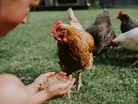Tyson & JBS: Blockchain Boosts Organic Chicken Traceability

The global organic chicken market is poised for growth, with projections indicating an increase of US$10bn from 2024 to 2028.
According to Technavio, the industry-leading market research and advisory firm, this surge is driven by rising consumer demand for healthier, ethically-sourced poultry and the adoption of blockchain technology to ensure supply chain transparency.
Blockchain is a secure digital ledger, meaning that for the organic chicken market, it can ensure transparency and traceability, allowing consumers to verify the chicken's organic status and origins, boosting consumer trust and reducing fraud.
Among the organisations leading this charge are JBS SA and Tyson Foods, amid the world’s largest marketers and processors of meat.
How have Tyson Foods and JBS SA embraced blockchain?
The organic chicken market has evolved significantly since its inception in the late 20th century.
Much like how the top supply chain traceability platforms in the world are used, including IBM Sterling Transparent Supply, Inspectorio and Zetes’ product traceability software, ZetesOlympus, the food industry is utilising similar traceability technologies to trace organic chicken.
Now, JBS SA and Tyson Foods are leveraging blockchain technology to enhance the traceability and authenticity of their organic products.
Tyson Foods has been expanding its organic offerings while integrating blockchain to provide consumers with verifiable information about the origin and journey of their products.
The company has also partnered with FoodLogiQ, a leading software provider specialising in food safety compliance and supply chain transparency, to implement a blockchain-based system for global supply chain visibility and supplier management.
Similarly, Perdue Farms, a prominent American food and agriculture business, has invested heavily in blockchain to ensure the integrity of its organic chicken supply chain.
Meanwhile, JBS SA, parent company of JBS, also a global food processing company specialising in meat production, is capitalising on blockchain technology by aiming to offer unparalleled transparency and traceability, reinforcing consumer confidence in their organic chicken products.
JBS has also developed the JBS Green Platform, underpinned by blockchain technology, that is a cornerstone of JBS's "Together for the Amazon" programme.
This sustainability initiative aims to enhance conservation and development of the Amazon Biome, engaging the livestock industry and proposing actions beyond its value chain.
The programme focuses on climate change and comprises four pillars: value chain development, forest conservation and restoration, community support and scientific and technological advancement.
Gilberto Tomazoni, global CEO of JBS SA, commented regarding this programme: "We are publicly reiterating our commitment to the sustainability of the Amazon. We hope to scale up, not only in combating deforestation, but also in fostering the bio-economy, sustainable agriculture and social development.”
More recently, JBS SA has also developed its own Transparent Livestock Farming Platform, utilising blockchain to monitor suppliers and ensure compliance with socio environmental standards.
Trends and challenges of blockchain for organic chicken market
Blockchain technology is changing the organic chicken market by addressing one of its most significant challenges: ensuring the provenance of organic produce.
This open, distributed ledger system efficiently records transactions between parties, ensuring compliance with certifying agencies regarding livestock origin, feed and living conditions.
This level of transparency is expected to drive market growth during the forecast period.
Yet the adoption of blockchain technology is not the only trend shaping the organic chicken market.
Increasing availability of organic chicken products in major retailers and food service providers is making these products more accessible to a broader consumer base.
This trend is particularly evident in developed markets such as North America and Europe, but is also gaining traction in emerging economies.
As consumers continue to prioritise health, sustainability and ethical consumption, the organic chicken industry is well-positioned for sustained growth.
However, despite the positive outlook, challenges remain.
Stringent regulations and the higher costs associated with organic farming practices could pose obstacles to market expansion.
Yet despite this, industry leaders are optimistic that technological innovations and economies of scale will help address these challenges in the coming years.
Henry Duckworth, COO of global food supply chain blockchain solution, AgriDex, says: “Using blockchain technology, consumers can easily verify the origin and safety of their food, while farmers can access vital information about market demand and pricing. A study by IBM found that 71% of consumers who feel traceability is important say they would pay a premium for brands that provide it.”
--------------
Make sure you check out the latest news at Food Digital, a BizClik brand




